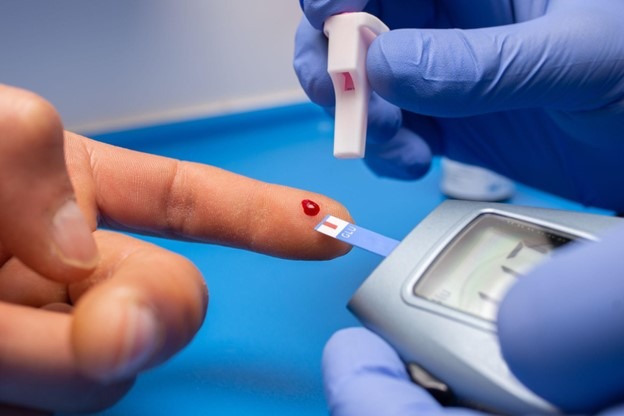The Random Blood Sugar (RBS) test is a diagnostic test used to measure the level of glucose in the blood at any point in time, regardless of when you last ate. This test is essential for diagnosing and monitoring diabetes and assessing your body’s ability to manage blood sugar. Unlike fasting blood sugar tests, the RBS test can be taken at any time, offering a convenient method to track your glucose levels throughout the day.
Why is the Random Blood Sugar Test Important?
- Diabetes Diagnosis: The RBS test is one of the key methods for diagnosing Type 1, Type 2, and gestational diabetes. Elevated random blood sugar levels may signal issues with how the body processes glucose.
- Diabetes Management: For individuals already diagnosed with diabetes, the test helps in monitoring blood sugar levels and ensuring effective management of the condition.
- Quick Health Snapshot: Since the test doesn’t require fasting, it provides a quick way to check glucose levels, making it useful in urgent care situations.
Normal and Abnormal Blood Sugar Levels
- Normal Range: A random blood sugar level below 140 mg/dL (7.8 mmol/L) is typically considered normal.
- Prediabetes: Levels between 140 and 199 mg/dL suggest prediabetes, where blood sugar is higher than normal but not yet in the diabetic range.
- Diabetes: A reading of 200 mg/dL (11.1 mmol/L) or higher, particularly if accompanied by symptoms like excessive thirst or frequent urination, indicates diabetes.
Who Should Take the Random Blood Sugar Test?
- Those with Symptoms of Diabetes: If you experience signs such as frequent urination, excessive thirst, fatigue, or blurred vision, an RBS test may help identify diabetes.
- Routine Checkups: Individuals at risk of diabetes, including those with a family history, obesity, or sedentary lifestyles, may undergo regular RBS tests as part of their health checkups.
- Monitoring Diabetics: People already diagnosed with diabetes can use this test to ensure their blood sugar levels remain within the recommended range.
Causes of Elevated Random Blood Sugar
- Type 1 Diabetes: This condition occurs when the body’s immune system attacks insulin-producing cells, resulting in elevated blood glucose levels.
- Type 2 Diabetes: Characterized by insulin resistance, where the body does not respond properly to insulin, causing blood sugar to rise.
- Gestational Diabetes: Some women experience elevated blood sugar during pregnancy, which can affect both mother and baby.
- Illness or Stress: Physical illness, infections, or emotional stress can temporarily raise blood sugar levels.
How to Prepare for the Test
The best part of the Random Blood Sugar Test is that it requires no special preparation. It can be done at any time during the day, whether or not you have eaten recently. It’s quick, non-invasive, and can be performed as part of routine checkups or in cases of emergency.
How is the RBS Test Performed?
- Sample Collection: The test involves taking a small blood sample, typically via a finger prick or a blood draw from a vein.
- Quick Results: Results are usually available within a few minutes, especially if performed in a doctor’s office or laboratory setting.
Benefits of Regular Blood Sugar Monitoring
- Early Detection of Diabetes: By regularly checking your blood sugar, you can catch potential health issues before they escalate.
- Prevention of Complications: Early intervention through diet, exercise, or medication can help avoid long-term complications such as nerve damage, kidney problems, or heart disease.
- Tailored Treatment Plans: Monitoring helps doctors adjust treatment plans, including medications or insulin, to better manage blood sugar levels.
Managing High Blood Sugar Levels
- Healthy Diet: Consuming a balanced diet with plenty of fruits, vegetables, lean proteins, and whole grains can help regulate blood sugar.
- Exercise: Physical activity is key in helping the body use insulin more effectively, thereby lowering blood sugar levels.
- Medications: For those diagnosed with diabetes, regular monitoring can help determine whether medication or insulin adjustments are necessary.
Conclusion
The Random Blood Sugar (RBS) test is an easy, fast, and reliable way to check your blood sugar levels at any point during the day. Whether you’re monitoring your health, diagnosing diabetes, or managing an existing condition, this test provides essential insights into how your body processes glucose. Keeping blood sugar levels in check is crucial for long-term health, preventing complications, and improving quality of life.





